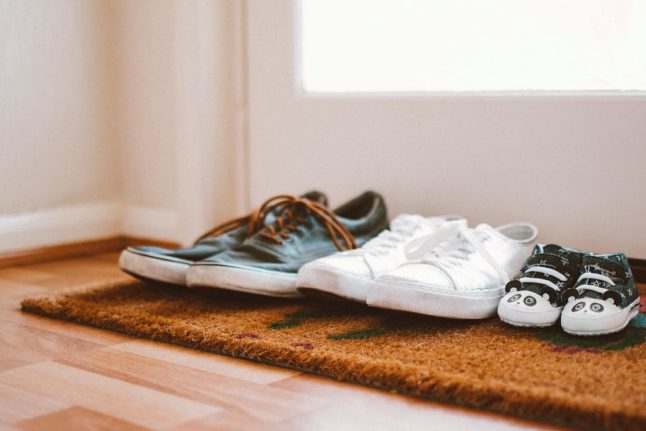Generally, it’s not the norm to remove your ‘outdoor’ shoes inside the house in Spain if you are a guest, or even if it’s your home.
It’s unlike in Japan for example, where guests are expected to take them off as it’s considered rude not to. In many Middle Eastern countries with Muslim populations, you’re also required to remove them as the soles of shoes are considered dirty.
There are several worldwide maps published by various independent companies and most of them list Spain as a ‘shoes on country’.
This means that generally you won’t be expected to remove them at the door.
There are several reasons why this might be – it could be down to the fact that most of Spain is generally dry and snow is scarce in main cities, meaning that people are not likely to traipse in mud, water, or dirty snow.
The streets are mainly paved too, so there’s not much chance of bringing sand or dust in either, unless you’ve just come from the beach of course.
It could also be down to the fact that most houses in Spain don’t have carpets either. The floors are either tiled or wooden, meaning that it’s a lot colder on the feet if you’re not wearing shoes. But, it also makes the floors easier to clean, so some people don’t deem it necessary to remove shoes.
Having said all that, it’s generally down to personal preference and you will find that some Spaniards don’t wear shoes in the house. While some may ask you to take them off upon entering the house, others won’t expect guests to do so, even though they do it themselves.
Many Spaniards in fact have what’s known as indoor shoes or slippers. When coming home from outside, they’ll remove their shoes, but instead of going barefoot will change to softer (and cleaner) indoor shoes or slippers.
Of course, you’re unlikely to bring slippers with you to someone’s home, so they’ll generally let you keep your outdoor shoes on.
It may depend on where you are in the country or the type of people you’re visiting too. For example, in rural areas where there are lots of farms and mud, you may want to remove your shoes instead of dirtying someone’s home.
If you want to take off your shoes anyway because you prefer not wearing them indoors, you can be safe in the knowledge that this won’t cause offence as Spaniards are generally very easy-going and it’s not a cultural taboo.
In cities in Spain, some people may ask you to remove shoes too, although for different reasons. There are more dogs in Spain for example than children under the age of 15 and the majority of them are using the street as their toilet. While you’re expected to clean up your dog’s excrement, dog urine often just gets left.
READ ALSO: What are the fines for not picking up dog poo in Spain?
The streets are not always sparkling clean in Spain either even though cleaning services do operate, so you could easily be walking germs into people’s homes and it’s not surprising that some may ask you to remove your shoes.
A study from the Department of Earth Sciences at Indiana University in the US found that in samples from the soles of shoes, around 99 percent of shoes test positive for faecal matter. Another study conducted by Dr. Charles Gerba, a microbiologist at the University of Arizona, showed that the soles of our shoes contain on average 421,000 bacteria, while 2,887 are found inside the shoe too.
Barcelona University also carried out its own study and found out that clothes, including shoes, accumulated up to six times more bacteria than toilet seats.
READ ALSO: Why do Spaniards have very clean homes?
Spaniards are known for their love of cleaning, however, and generally clean a lot more than their European neighbours. According to a study by apartment hunter platform Kobolo, 77 percent of respondents say they clean between one and three times a week. In addition, 60 percent dedicate between two and four hours on average a week to tidying their house.
Therefore, because they’re cleaning so often, many Spaniards may not be so worried about the germs brought in on shoes and will generally be fine with you wearing them.
How about you? Do you ask guests to take their shoes off at your home in Spain or do you let them wear them indoors? Let us know in the comment section below.



 Please whitelist us to continue reading.
Please whitelist us to continue reading.
Member comments